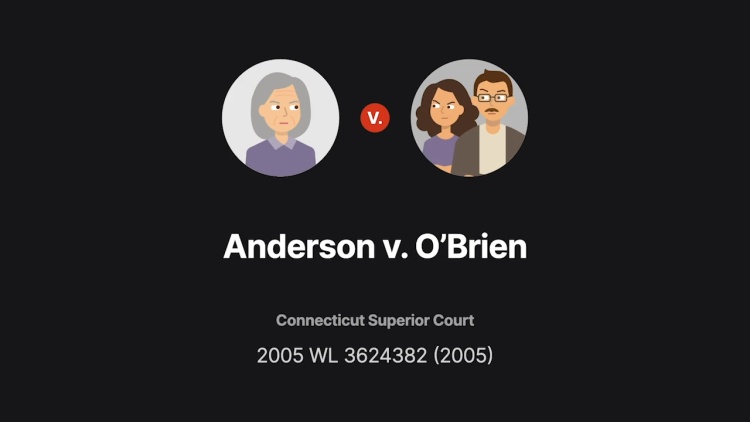Anderson v. O'Brien
Connecticut Superior Court
2005 WL 3624382 (2005)

- Written by Carolyn Strutton, JD
Facts
Mrs. Anderson (plaintiff) was an elderly, childless widow who owned a house in a desirable neighborhood. Mr. and Mrs. O’Brien (defendants) befriended Anderson in order to persuade her to sell her house to them. Anderson eventually agreed to sell the O’Briens her house after the O’Briens promised to build her a cottage on the property in which she could live for the rest of her life. The O’Briens had their attorney, Mr. Manko (defendant), prepare a contract for the sale. The contract mentioned Anderson’s right to live in a cottage on the property but failed to provide her with a life estate to the property. Anderson signed the contract. A month before the specified closing date, while Anderson was ill, the O’Briens brought her to Manko’s office at the end of the day for the closing. Anderson expressed concern that she should have her own attorney, but the O’Briens and Manko reassured her that Manko would represent all of the parties well. Anderson did not read the closing documents, nor were they read aloud to her; however, she signed them anyway. After the closing, the O’Briens began to treat Anderson cruelly. The structure that was built for her on the property was more like a barn than a cottage and would not accommodate her furnishings. Anderson sued the O’Briens for fraud, breach of contract, and emotional distress, as well as Manko for legal malpractice, fraud, violations of state unfair-trade practices, and breach of fiduciary duty. Manko filed a motion for dismissal for failure to state a claim.
Rule of Law
Issue
Holding and Reasoning (Lopez, J.)
What to do next…
Here's why 907,000 law students have relied on our case briefs:
- Written by law professors and practitioners, not other law students. 47,100 briefs, keyed to 996 casebooks. Top-notch customer support.
- The right amount of information, includes the facts, issues, rule of law, holding and reasoning, and any concurrences and dissents.
- Access in your classes, works on your mobile and tablet. Massive library of related video lessons and high quality multiple-choice questions.
- Easy to use, uniform format for every case brief. Written in plain English, not in legalese. Our briefs summarize and simplify; they don’t just repeat the court’s language.





